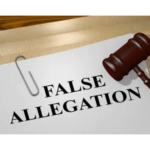Readily Accepting Sexual Assault Complaints Could Cost Taxpayers Billions

Seven people have been arrested after a police investigation into alleged fraudulent compensation claims for historical sexual abuse in New South Wales institutions including schools and correctional facilities.
The scheme is alleged to have involved a number of ‘claim farmers’ who would approach adults that had been incarcerated as juveniles, as well as former public school students, and encourage them to arrange conferences with Sydney law firms during which they would make false claims of having been sexually abused while in the care of the state.
The law firms are alleged to have then filed claims against the NSW Department of Education and NSW Department of Communities and Justice through the National Redress Scheme, resulting in at least $1 billion dollars in taxpayer funds being paid into their trust accounts, after which legal fees were withdrawn and the remainder disbursed to their clients.
The firms are alleged to have paid the claim farmers for each referral, although there is no suggestion they were complicit in the alleged fraud scheme or any other misconduct.
Always believe the ‘victim’
In recent years, the #metoo movement has led to an increasing reluctance to question complainants in sexual assault cases, as well as changes to criminal laws which include the introduction of ‘affirmative consent’ requirements and sexual consent directions to the jury which essentially make it far easier to convict defendants – including those who are innocent.
There have also been changes to civil laws which have seen the removal a number of obstacles to bringing civil claims for historical sexual assault, including time limitations and protections for various institutions.
The strong presumption that sexual assault complainants are telling the truth, and resulting lack of scrutiny of claims, has made it easier to exploit initiatives such as the National Redress Scheme, which was established by the Commonwealth Government in response to the Royal Commission into Institutional Responses to Child Sexual Abuse.
In that regard, Detective Superintendent Gordon Arbinja from the NSW Police Force Financial Crimes Squad acknowledges the ‘system is porous and needs to be strengthened.’
This ‘loophole’ means unscrupulous individuals have been able to defraud taxpayers of what is likely to amount to billions of dollars, which not only affects the economy but also potentially reduces access to funds for genuine victims and promotes an environment whereby excessive scrutiny may be placed on those who are most deserving of the funds.
The current investigation alone alleges defrauding to the sum of around $1 billion.
Arrests made
According to police, a search warrant was executed just after 6am on 12 February 2025 at the home of a 55-year old man from Girraween on the NSW/Queensland border, who was taken into custody and charged with 21 fraud offences, including nine counts of dishonestly obtaining a financial advantage by deception under section 192E of the Crimes Act 1900, as well as eight counts of intention to defraud by false or misleading statement under section 192G of the Act.
The man is alleged to have obtained $220,000 for referring false complainants to Sydney law firms.
A search warrant was also executed on the same morning at the home of a 53-year old woman in Granville in Sydney’s western suburbs, leading to her being arrested and charged with intention to defraud by false or misleading statement.
Three other men and two other women were also arrested and charged with the same offence, one of the men posing as a member of a victims’ advocate group to allegedly solicit potential claimants.
The seven individuals are alleged to have obtained a total of $4 million in referral fees.
Dishonestly obtaining an advantage by deception
Dishonestly obtaining an advantage by deception falls within the definition of fraud, which is an offence under section 192E of the Crimes Act 1900 that carries a maximum penalty of 10 years in prison.
To establish the offence, the prosecution must prove beyond reasonable doubt that:
- A person obtained property belonging to another, or obtained a financial advantage or caused a financial disadvantage,
- The person did so dishonestly, and
- The person used deception to do so.
To obtain property belonging to another includes to:
- Obtain ownership, possession or control for themselves or another person,
- Enable the retention of ownership, possession or control for themselves or another, or
- Induce a third party to do something that results in that person or another to obtain or retain ownership, possession or control.
Property belongs to another if the person has possession or control of it, or any proprietary right or interest in it, other than an equitable interest arising solely from an agreement to transfer a grant or interest in a constructive trust.
To obtain a financial advantage includes to:
- Obtain the advantage for themselves or another person,
- Induce a third party to do something that results in the advantage, or
- Keep an advantage already possessed.
To cause a financial disadvantage means to:
- Cause the advantage to another person, or
- Induce a third party to do something that results in another person suffering the disadvantage.
The advantage or disadvantage may be permanent or temporary.
A deception may be by words or other conduct, and as to fact or law, including:
- As to the intentions of the person using the deception or any other person, or
- Conduct by a person that causes a computer, machine or any electronic device to make a response that the person is not authorised to cause or make.
The deception may be intentional or reckless. A deception is reckless if the maker was aware there was a substantial risk their conduct would deceive, and it was unjustifiable in the circumstances to take that risk, but the maker went ahead with their actions regardless.
Intention to defraud by false or misleading statement
Intention to defraud by false or misleading statement is an offence under section 192G of the Crimes Act 1900 which carries a maximum penalty of 5 years in prison.
To establish the offence, the prosecution must prove beyond reasonable doubt that:
- A person made or published, or concurred in the making or publishing of, a statement,
- The statement was made or published dishonestly,
- The statement was false or misleading in a material particular, and
- The person made or published the statement with the intention of obtaining property belonging to another, obtaining a financial advantage or causing a financial disadvantage.
The statement may be written or verbal, and may published by any means including directly to any other person.
Legal defences
In addition to having to prove each of the above elements (ingredients) of a fraud offence beyond a reasonable doubt, the prosecution must also disprove to the same high standard any legal defence raised by the evidence in the case.
A person must be acquitted (found not guilty) if the prosecution is unable to do this.
Legal defences to fraud charges include duress and mental illness.
Cracking down on claim farming
Claim Farming is a practice whereby third parties, without consent, contact potential claimants to encourage them to file legal claims. The practice often targets and exploits vulnerable individuals.
The newly introduced Claim Farming Practices Prohibited Bill 2025 (NSW) proposes to amend the Civil Liability Act 2002 (NSW) with a view to reducing claim farming by, among other things, prohibiting:
- Unsolicited contact such as approaching potential claimants without consent to encourage claims,
- The obtaining of fees for referring claimants to law firms, and
- Lawyers from charging legal fees related to farmed claims.
Going to Court for a fraud-related offence?
If you have been charged with a fraud-related offence, call Sydney Criminal Lawyers 24/7 on (02) 9261 8881 to arrange a free consultation with a specialist criminal defence lawyer who will advise you in relation to the allegations and the court process, inform you of your options including the optimal way forward and use their vast experience to fight for the best possible outcome.







